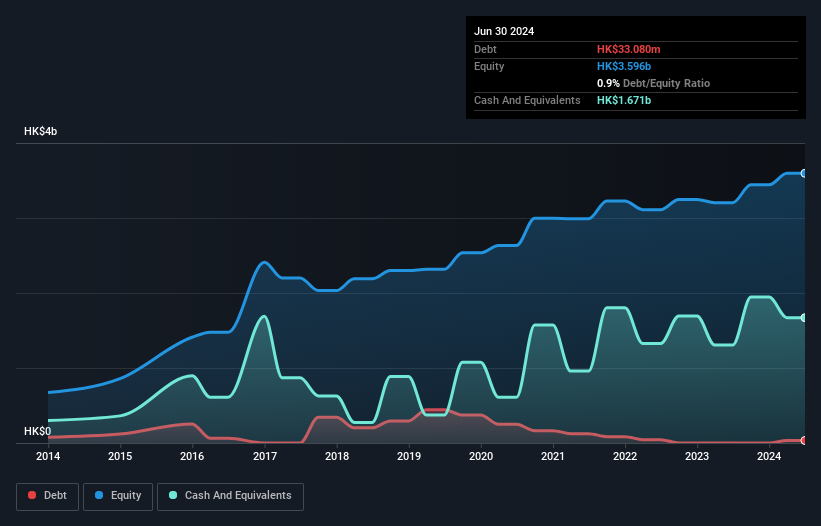
Some say volatility, rather than debt, is the best way to think about risk as an investor, but Warren Buffett famously said that 'Volatility is far from synonymous with risk.' So it seems the smart money knows that debt - which is usually involved in bankruptcies - is a very important factor, when you assess how risky a company is. As with many other companies Sundart Holdings Limited (HKG:1568) makes use of debt. But is this debt a concern to shareholders?
Why Does Debt Bring Risk?
Debt is a tool to help businesses grow, but if a business is incapable of paying off its lenders, then it exists at their mercy. If things get really bad, the lenders can take control of the business. While that is not too common, we often do see indebted companies permanently diluting shareholders because lenders force them to raise capital at a distressed price. Of course, plenty of companies use debt to fund growth, without any negative consequences. The first thing to do when considering how much debt a business uses is to look at its cash and debt together.
View our latest analysis for Sundart Holdings
What Is Sundart Holdings's Debt?
You can click the graphic below for the historical numbers, but it shows that as of June 2024 Sundart Holdings had HK$33.1m of debt, an increase on HK$421.0k, over one year. But it also has HK$1.67b in cash to offset that, meaning it has HK$1.64b net cash.

How Strong Is Sundart Holdings' Balance Sheet?
Zooming in on the latest balance sheet data, we can see that Sundart Holdings had liabilities of HK$3.30b due within 12 months and liabilities of HK$5.36m due beyond that. On the other hand, it had cash of HK$1.67b and HK$4.23b worth of receivables due within a year. So it can boast HK$2.60b more liquid assets than total liabilities.
This surplus liquidity suggests that Sundart Holdings' balance sheet could take a hit just as well as Homer Simpson's head can take a punch. On this view, lenders should feel as safe as the beloved of a black-belt karate master. Simply put, the fact that Sundart Holdings has more cash than debt is arguably a good indication that it can manage its debt safely.
In addition to that, we're happy to report that Sundart Holdings has boosted its EBIT by 48%, thus reducing the spectre of future debt repayments. The balance sheet is clearly the area to focus on when you are analysing debt. But you can't view debt in total isolation; since Sundart Holdings will need earnings to service that debt. So if you're keen to discover more about its earnings, it might be worth checking out this graph of its long term earnings trend.
But our final consideration is also important, because a company cannot pay debt with paper profits; it needs cold hard cash. While Sundart Holdings has net cash on its balance sheet, it's still worth taking a look at its ability to convert earnings before interest and tax (EBIT) to free cash flow, to help us understand how quickly it is building (or eroding) that cash balance. Over the last three years, Sundart Holdings recorded free cash flow worth a fulsome 96% of its EBIT, which is stronger than we'd usually expect. That positions it well to pay down debt if desirable to do so.
Summing Up
While we empathize with investors who find debt concerning, the bottom line is that Sundart Holdings has net cash of HK$1.64b and plenty of liquid assets. The cherry on top was that in converted 96% of that EBIT to free cash flow, bringing in HK$378m. The bottom line is that Sundart Holdings's use of debt is absolutely fine. When analysing debt levels, the balance sheet is the obvious place to start. But ultimately, every company can contain risks that exist outside of the balance sheet. Case in point: We've spotted 1 warning sign for Sundart Holdings you should be aware of.
Of course, if you're the type of investor who prefers buying stocks without the burden of debt, then don't hesitate to discover our exclusive list of net cash growth stocks, today.
Have feedback on this article? Concerned about the content? Get in touch with us directly. Alternatively, email editorial-team (at) simplywallst.com.
This article by Simply Wall St is general in nature. We provide commentary based on historical data and analyst forecasts only using an unbiased methodology and our articles are not intended to be financial advice. It does not constitute a recommendation to buy or sell any stock, and does not take account of your objectives, or your financial situation. We aim to bring you long-term focused analysis driven by fundamental data. Note that our analysis may not factor in the latest price-sensitive company announcements or qualitative material. Simply Wall St has no position in any stocks mentioned.